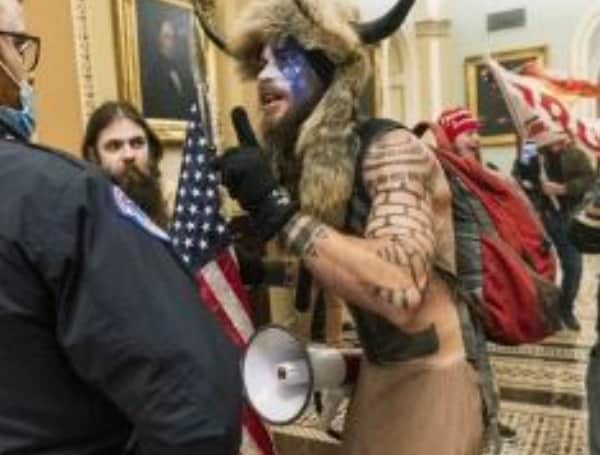With his patriotic face paint, flag-festooned spear and horned headdress, Jacob Chansley clearly stood out among the rioters who stormed the U.S. Capitol last week.
Chansley, the self-described “QAnon Shaman” who has been a regular at President Donald Trump’s rallies, has since made news because he has refused to eat non-organic food while in jail awaiting charges on disorderly conduct and other offenses.
Now, it turns out Chansley is a U.S. Navy veteran whose military career ended not long after it started.
According to Military.com, Chansley joined the Navy in September 2005 to serve as a supply clerk seaman apprentice. He exited the military in October 2007.
But the website Task&Purpose.com filled in some of the details as to why Chansley left after two years.
After completing his recruit and career-specialty training, Chansley was ordered to USS Kitty Hawk in March 2006.
He remained on board the carrier until Sept. 29, 2007, when he was transferred to a Transient Personnel Unit in Puget Sound in Washington state. He was discharged from Navy roughly two weeks later.
Task & Purpose reported that Chansley was “booted from the service after he refused to take the anthrax vaccine.”
It’s unclear what type of discharge he received. Task & Purpose noted he did receive the National Defense Service Medal, Global War on Terrorism Service Medal, Sea Service Deployment Ribbon, and the Navy and Marine Corps Overseas Service Ribbon — but no personal awards.
According to a 2007 article in the American Medical Association’s Journal of Ethics, the Pentagon mandated anthrax vaccines in 1997. The vaccine used by the military had been developed in the 1950s and was considered 93 percent effective.
Yet, “questions arose about the proper use of vaccinations and whether service men and women were placed at undue risk without their informed consent,” the AMA noted.
Not long after the immunization program started, “soldiers began complaining of side effects, many of which were debilitating to the point that some were unable to perform their duties,” the AMA reported.
“Some refused the vaccination and were sanctioned or threatened with discharge or other punishment that could negatively affect their careers,” including being sent to jail, the article stated.
“Those who complained of side effects also faced discipline, leading one soldier to sue the military for a violation of free speech rights.”
A federal judge eventually suspended the vaccines unless soldiers gave their consent.
About three months after Chansley had joined the Navy, the FDA declared the vaccine was safe. In October 2006, the Pentagon directed the vaccines to be administered again.
But some soldiers still refused, and in 2006, a half-dozen personnel sued the military. They claimed that the vaccine had not been approved by the Food and Drug Administration as a guard against inhaled anthrax.
The military in February 2007 announced that the vaccine would be mandatory for troops in certain high-threat areas or special mission units.
The military ultimately dismissed hundreds of troops, like Chansley, who refused to take the vaccine.
But in 2020, Pam Long, a West Point graduate and veteran of the Army’s medical corps, in an article discussing how the anthrax controversy could be applied to a possible COVID-19 vaccine, noted, “As of 2020, the risk of death from the inhalation of anthrax, which was used to justify the program, has never been substantiated.”
She added, “To date, DOD has not considered correcting the records of court-martialed and punished soldiers who refused an illegally-mandated experimental vaccine based on a manufactured crisis.”

